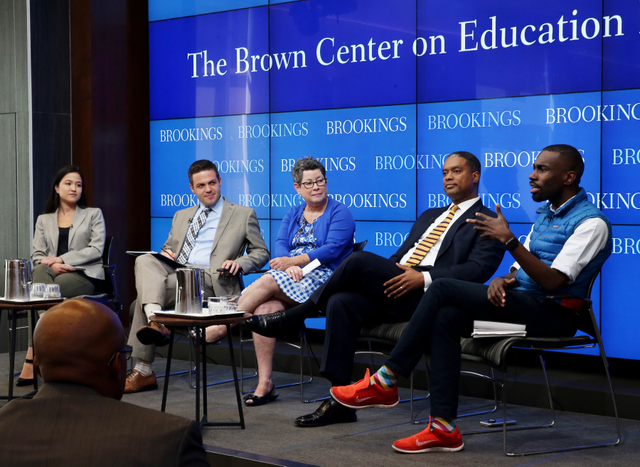On June 8, the Brown Center on Education Policy at Brookings hosted a public event to discuss the intersection of race and education in 2016. With “Bringing education disparities to the forefront of the political debate,” a panel of community leaders and education experts gathered to discuss the importance of seizing the opportunity afforded by the ongoing national dialogue around racial and economic inequities. The event covered a lot of ground by highlighting how far we have come but how far we still need to go.
Disparities in education are vast: “We could be here for weeks”
Panelists spoke at length about many pressing issues in K-12 education, with a main topic of discussion being how to bridge the achievement gap between white and non-white students. Brown Center Deputy Director Michael Hansen addressed the lack of diversity among America’s teachers, which he says will become worse as America’s racial demographics continue to change. He argued that direct policy intervention is necessary to address this issue because, “based on the numbers…it’s just not happening.”
Peggy McLeod, Deputy Vice President of Education and Workforce Development at National Council of La Raza, spoke about Latino children in America’s schools, who account for a quarter of all children in the United States. She noted the success of the Latino community in raising graduation rates and college enrollment, but also referenced the ongoing issues of retention and access to academic resources.
American Enterprise Institute Resident Fellow Gerard Robinson affirmed the reality of racial disparities in education. He pointed to 2013-2014 civil rights data collection from the U.S. Department of Education (released the day before the event), saying that the data “shocked some people, for others it was a yawn.” Robinson cautioned against addressing only inequities between white students and black and Latino students, as such comparisons not only exclude Asian-Americans (the so-called “model minority”), but also gloss over issues that exist within groups and states, for instance.
DeRay Mckesson, a former teacher and a Black Lives Matter Political Activist and Organizer, discussed how recruiting, training, and retaining better teachers is an important part of solving these issues, but the problem runs deeper. Returning to the achievement gap, Mckesson said that the gaps between racial communities have been allowed “to fester for so long,” and that “the K-12 issue is only part of the puzzle.” Before educational inequalities can truly be fixed, there must be an understanding of “the deeper racial history” that allowed such disparities to form and grow.
Struggling schools need good teachers. How can we get them there?
Panelists turned to the issue of teachers and how they can be recruited and trained to work in the school systems that are most in need of aid. Hansen raised the idea of higher compensation for teachers who go to struggling schools. Although there may be collective bargaining issue to overcome, incentivizing teachers to go to certain districts could attract and keep good teachers, improving the quality of education.
McLeod added that much of the problem in diversifying schools comes from the devaluation of teachers within America, a trend that has continued for decades. She recommends that teachers begin work with a higher base salary. Moreover, the social importance of teachers should be recognized as well, as “teachers don’t work until three o’clock and go home.” Properly valuing the services that teachers provide is a key way of bringing more people, including Latinos, into the profession.
“Teachers don’t work until three o’clock and go home.”
Robinson agreed that paying teachers higher salaries is an effective way of putting better teachers in struggling schools. He also recommends that states create incentives for National Board certified teachers to work at high-need schools. The bigger issue, he says, is that the supply of teachers will not be able to keep up with population trends. “Instead of trying to birth teachers, we must invent teachers.” Incorporating technology could be one way to spread teachers’ services across the country.
Mckesson focused on school culture rather than teacher pay, as teachers are more willing to work in schools that have a productive and positive atmosphere. Creating such schools requires a strong community of leaders and most school systems struggle to develop an optimal recruitment and placement system to match them with where leaders can work best. He also suggested some burdensome, yet structural solutions, pointing to his experiences working to diversify teachers in Minneapolis: “We were not hiring teachers of color, it was really bad. And we made the commitment… to interview every single teacher that applies, which was like a wild commitment…it was not easy to do but we did it, and it changed the face of teaching in Minneapolis because we were just, we were missing people.”
Teaching the intangibles: Should schools cultivate “grit” in their students?
Moderator Alia Wong, Associate Editor at The Atlantic, questioned panelists about the recent, popular buzzword in education circles: grit. McLeod was skeptical, believing the term to be another education fad that would come and go. Robinson believed that simplifying the solution to education problems through such terms ignores the full extent of the issues. He noted that “the people who actually have to do this don’t call it ‘grit,’ they call it ‘life.’” Hansen said that focusing on intangible skills is an important way of recognizing the value of schools in shaping their students. Although also skeptical of current policy initiatives to implement such qualities, he believed that the concept does warrant further study.
“The people who actually have to do this don’t call it ‘grit,’ they call it ‘life.’”
Missed our education disparities event on June 8, 2016 or want to learn more? See the
Bringing education disparities to the forefront of the political debate event page for a full video recap
.
Also see the post-event Facebook Live conversation with Alia Wong and DeRay Mckesson.
Thank you to Grant Michl for contributing to this post.
The Brookings Institution is committed to quality, independence, and impact.
We are supported by a diverse array of funders. In line with our values and policies, each Brookings publication represents the sole views of its author(s).




